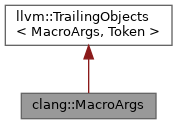MacroArgs - An instance of this class captures information about the formal arguments specified to a function-like macro invocation. More...
#include "clang/Lex/MacroArgs.h"

Public Member Functions | |
| void | destroy (Preprocessor &PP) |
| destroy - Destroy and deallocate the memory for this object. | |
| bool | ArgNeedsPreexpansion (const Token *ArgTok, Preprocessor &PP) const |
| ArgNeedsPreexpansion - If we can prove that the argument won't be affected by pre-expansion, return false. | |
| const Token * | getUnexpArgument (unsigned Arg) const |
| getUnexpArgument - Return a pointer to the first token of the unexpanded token list for the specified formal. | |
| const std::vector< Token > & | getPreExpArgument (unsigned Arg, Preprocessor &PP) |
| getPreExpArgument - Return the pre-expanded form of the specified argument. | |
| unsigned | getNumMacroArguments () const |
| getNumMacroArguments - Return the number of arguments the invoked macro expects. | |
| bool | isVarargsElidedUse () const |
| isVarargsElidedUse - Return true if this is a C99 style varargs macro invocation and there was no argument specified for the "..." argument. | |
| bool | invokedWithVariadicArgument (const MacroInfo *const MI, Preprocessor &PP) |
| Returns true if the macro was defined with a variadic (ellipsis) parameter AND was invoked with at least one token supplied as a variadic argument (after pre-expansion). | |
| MacroArgs * | deallocate () |
| deallocate - This should only be called by the Preprocessor when managing its freelist. | |
Static Public Member Functions | |
| static MacroArgs * | create (const MacroInfo *MI, ArrayRef< Token > UnexpArgTokens, bool VarargsElided, Preprocessor &PP) |
| MacroArgs ctor function - Create a new MacroArgs object with the specified macro and argument info. | |
| static unsigned | getArgLength (const Token *ArgPtr) |
| getArgLength - Given a pointer to an expanded or unexpanded argument, return the number of tokens, not counting the EOF, that make up the argument. | |
| static Token | StringifyArgument (const Token *ArgToks, Preprocessor &PP, bool Charify, SourceLocation ExpansionLocStart, SourceLocation ExpansionLocEnd) |
| StringifyArgument - Implement C99 6.10.3.2p2, converting a sequence of tokens into the literal string token that should be produced by the C # preprocessor operator. | |
Detailed Description
MacroArgs - An instance of this class captures information about the formal arguments specified to a function-like macro invocation.
Definition at line 29 of file MacroArgs.h.
Member Function Documentation
◆ ArgNeedsPreexpansion()
| bool MacroArgs::ArgNeedsPreexpansion | ( | const Token * | ArgTok, |
| Preprocessor & | PP | ||
| ) | const |
ArgNeedsPreexpansion - If we can prove that the argument won't be affected by pre-expansion, return false.
Otherwise, conservatively return true.
Definition at line 145 of file MacroArgs.cpp.
References clang::Token::getIdentifierInfo(), and clang::Token::isNot().
◆ create()
|
static |
MacroArgs ctor function - Create a new MacroArgs object with the specified macro and argument info.
MacroArgs ctor function - This destroys the vector passed in.
Definition at line 23 of file MacroArgs.cpp.
References clang::MacroInfo::getNumParams(), clang::MacroInfo::isFunctionLike(), and clang::Result.
◆ deallocate()
| MacroArgs * MacroArgs::deallocate | ( | ) |
deallocate - This should only be called by the Preprocessor when managing its freelist.
Definition at line 90 of file MacroArgs.cpp.
◆ destroy()
| void MacroArgs::destroy | ( | Preprocessor & | PP | ) |
destroy - Destroy and deallocate the memory for this object.
Definition at line 77 of file MacroArgs.cpp.
◆ getArgLength()
getArgLength - Given a pointer to an expanded or unexpanded argument, return the number of tokens, not counting the EOF, that make up the argument.
Definition at line 107 of file MacroArgs.cpp.
References clang::Token::isNot().
Referenced by getPreExpArgument().
◆ getNumMacroArguments()
|
inline |
getNumMacroArguments - Return the number of arguments the invoked macro expects.
Definition at line 95 of file MacroArgs.h.
Referenced by getPreExpArgument(), getUnexpArgument(), and invokedWithVariadicArgument().
◆ getPreExpArgument()
| const std::vector< Token > & MacroArgs::getPreExpArgument | ( | unsigned | Arg, |
| Preprocessor & | PP | ||
| ) |
getPreExpArgument - Return the pre-expanded form of the specified argument.
Definition at line 160 of file MacroArgs.cpp.
References getArgLength(), getNumMacroArguments(), getUnexpArgument(), clang::Preprocessor::Lex(), clang::Preprocessor::RemoveTopOfLexerStack(), and clang::Result.
Referenced by invokedWithVariadicArgument().
◆ getUnexpArgument()
getUnexpArgument - Return a pointer to the first token of the unexpanded token list for the specified formal.
getUnexpArgument - Return the unexpanded tokens for the specified formal.
Definition at line 117 of file MacroArgs.cpp.
References getNumMacroArguments(), and clang::Result.
Referenced by getPreExpArgument().
◆ invokedWithVariadicArgument()
| bool MacroArgs::invokedWithVariadicArgument | ( | const MacroInfo *const | MI, |
| Preprocessor & | PP | ||
| ) |
Returns true if the macro was defined with a variadic (ellipsis) parameter AND was invoked with at least one token supplied as a variadic argument (after pre-expansion).
Definition at line 135 of file MacroArgs.cpp.
References getNumMacroArguments(), getPreExpArgument(), and clang::MacroInfo::isVariadic().
◆ isVarargsElidedUse()
|
inline |
isVarargsElidedUse - Return true if this is a C99 style varargs macro invocation and there was no argument specified for the "..." argument.
If the argument was specified (even empty) or this isn't a C99 style varargs function, or if in strict mode and the C99 varargs macro had only a ... argument, this returns false.
Definition at line 102 of file MacroArgs.h.
◆ StringifyArgument()
|
static |
StringifyArgument - Implement C99 6.10.3.2p2, converting a sequence of tokens into the literal string token that should be produced by the C # preprocessor operator.
If Charify is true, then it should be turned into a character literal for the Microsoft charize (#@) extension.
Definition at line 207 of file MacroArgs.cpp.
References clang::Preprocessor::CodeCompleteNaturalLanguage(), clang::Preprocessor::CreateString(), clang::Preprocessor::Diag(), clang::Token::getKind(), clang::Token::getLength(), clang::Preprocessor::getSpelling(), clang::Token::hasLeadingSpace(), clang::Invalid, clang::Token::is(), clang::Token::isAtStartOfLine(), clang::Token::isNot(), clang::tok::isStringLiteral(), memcpy(), clang::Result, clang::Token::setKind(), clang::Token::startToken(), and clang::Lexer::Stringify().
The documentation for this class was generated from the following files:
- include/clang/Lex/MacroArgs.h
- lib/Lex/MacroArgs.cpp